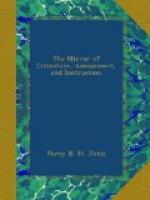port, which occupies the other fourth, and is gained
by three streets parallel to each other, and leading
from the “Place,” is small, but in excellent
order, and always alive with shipping, and the amusing
operations appertaining thereto; and the pier is a
most striking object, especially at high water, when
it runs out, in a straight line, for near three quarters
of a mile, into the open sea. It is true our English
engineers—who ruin hundreds of their fellow
citizens by spending millions upon a bridge that nobody
will take the trouble to pass over, and cutting tunnels
under rivers, only to let the water into them when
they have got all the money they can by the job—would
treat this pier with infinite contempt as a thing
that merely answers all the purposes for which it was
erected! as if
that were a merit of any but
the very lowest degree. “Look at Waterloo
Bridge!” they say; “we flatter ourselves
that was not a thing built (like the pier of
Calais) merely for use. Nobody will say that any
such thing was wanted! But, what a noble monument
of British art, and what a fine commemoration of the
greatest of modern victories!” True: but
it would have been all this if you had built it on
Salisbury Plain; and in that case it would have cost
only half the money. The pier of Calais is, in
fact, every thing that it need be, and what perhaps
no other pier is; and yet it is nothing more than
a piece of serviceable carpentery, that must have
cost about as much, perhaps, as to print the prospectuses
of some of the late undertakings, and pay the advertisements
and the lawyer’s bill.
Monthly Magazine.
* * * *
*
CURIOSITY.
If I were to enumerate all the great and venerable
personages who indulge in an extensive curiosity,
I should never arrive at the end of my subject.
Lawyers and physicians are eternal questionists; the
clergy are curious, especially on agricultural affairs;
the first nobles in the land take in the “John
Bull” and the “Age” to gratify the
most prurient curiosity. The gentlemen of the
Stock Exchange live only from one story to another,
and are miserable if a “great man’s butler
looks grave,” without their knowing why.
So general indeed is this passion, that one half of
every Englishman’s time is spent in inquiring
after the health of his acquaintance, and the rest
in asking “what news?” There is a very
respectable knot of persons who go up and down the
country asking people their opinion of the pope’s
infallibility, and what they think of the Virgin Mary;
and when they do not get an answer to their mind,
they fall to shouting, “The Church is in danger,”
like a parcel of lunatics. Another set, equally
respectable, are chiefly solicitous for your notions
concerning the Apocalypse; and to learn whether you
read your Bible at all, or whether with or without
note or comment. Then again, a third set of the




